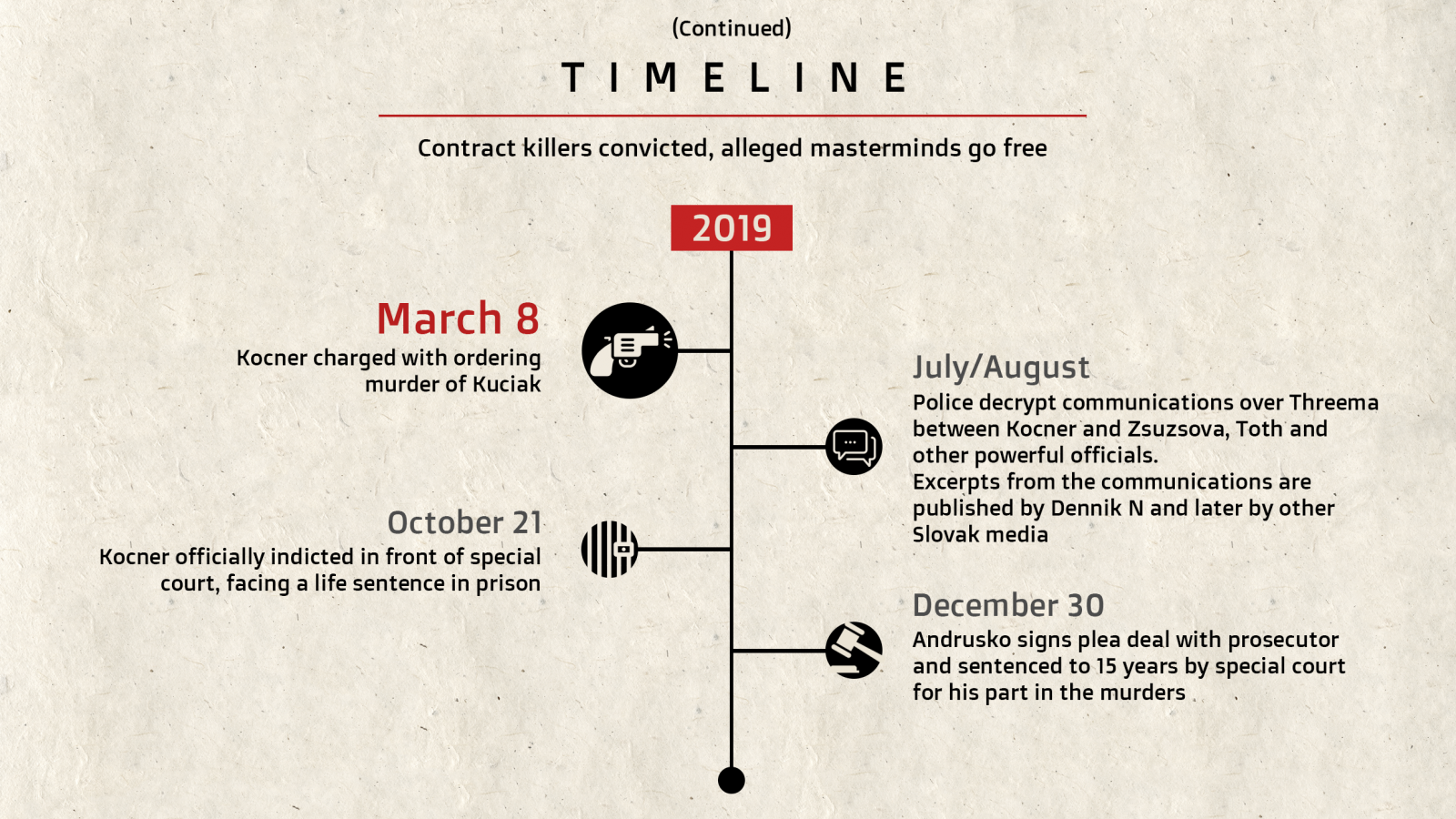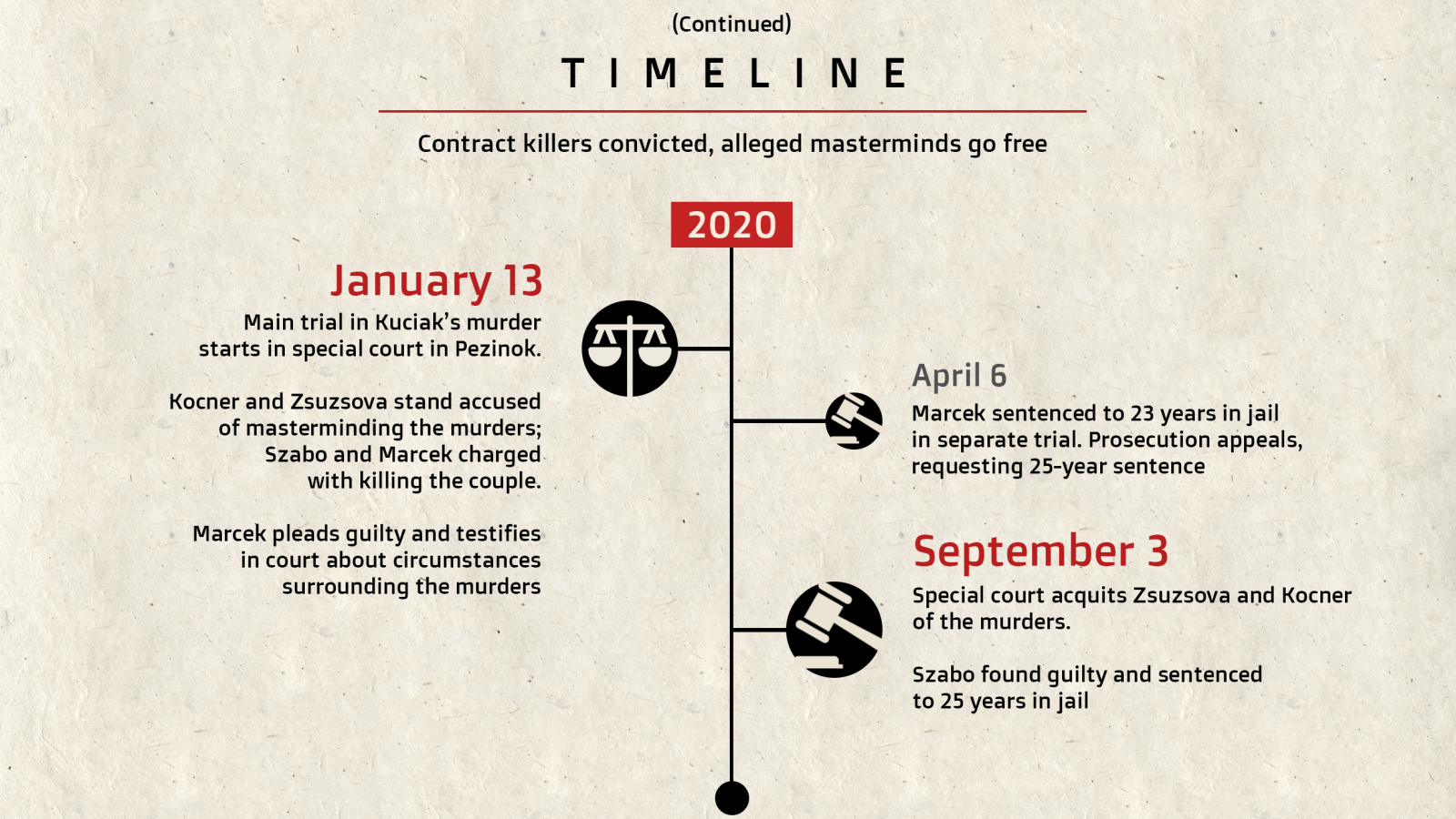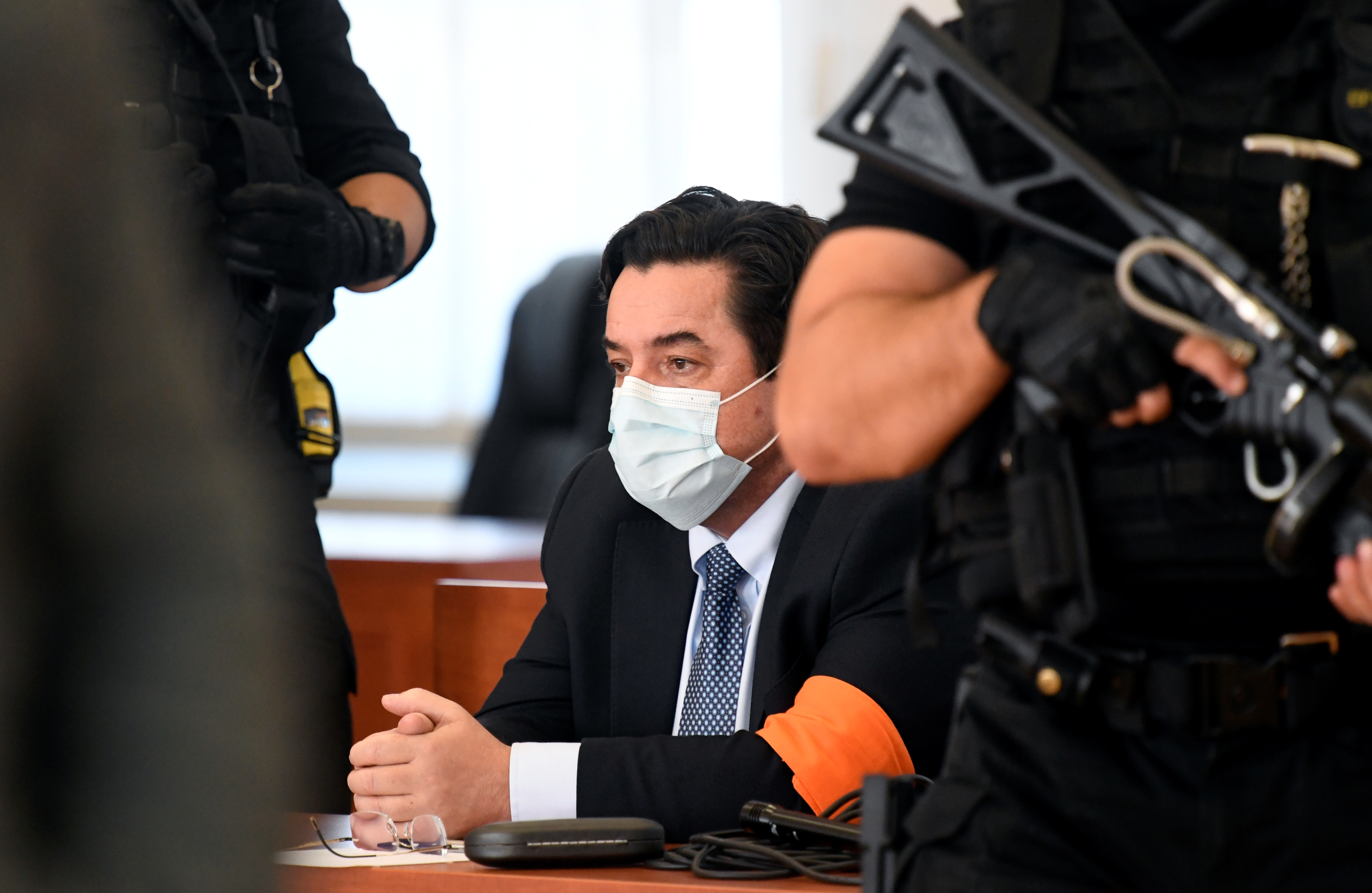17 December 2020
Originally published
16 September 2020
Source
How strong was the evidence against Marian Kočner and his associate in the murders of Ján Kuciak and his fiancée, and why wasn’t it enough to convict them?
On September 3, a three-judge senate at the special criminal court in Pezinok found Marian Kočner, a powerful businessman with close connections to politicians, and his associate Alena Zsuzsová not guilty of planning and paying for the murder of the investigative journalist Ján Kuciak and his fiancée Martina Kušnírová. Acquitting the pair, the chair of the senate, Ružena Sabová, explained that the judges had not heard enough evidence directly tying them to the crime. Despite the conviction of the three men hired to carry out the murder, the person – or persons – who ordered the contract killing remain free.
“Based on the evidence presented at trial, the court could not, beyond reasonable doubt, reach a conclusion that the killing of Ján Kuciak was orchestrated by the accused Kočner and Zsuzsová,” Judge Sabová told the court. In particular, the judges called into question the circumstantial evidence, the testimony of key witnesses and the communications between Kočner and Zsuzsová found on Kočner’s phone.
In reaction to the verdict, the prosecutor overseeing the state’s case announced he had already appealed to the Supreme Court, which could overturn the decision and return the case to the special court. Any ruling from the Supreme Court, however, is not expected before 2021. “We have lost the fight, but not the war,” Prosecutor Vladimír Turan declared to the press after the verdict. “We are not done fighting.”
Law enforcement and the General Prosecutor’s Office had been building a case against Kuciak’s alleged killers for almost two years, following the biggest investigation in Slovak criminal history. The case file, spanning more than 25,000 pages, included forensic evidence from the murder scene, expert analysis of phone and computer data, evidence collected at Kočner’s home, and testimonies from his associate Peter Tóth and Zoltán Andruskó, who admitted to acting as the middleman in the murder.
Two men, Andruskó and Miroslav Marček, pleaded guilty and testified over their involvement in the murder, receiving sentences of 15 and 23 years, respectively. Tomáš Szabó, Marček’s cousin who acquired the gun and drove Marček to the murder scene, pleaded not guilty, but was convicted and sentenced last week to 25 years in a maximum-security prison.
With the contract killers jailed but the mastermind of the murders still free, the trial has left many unanswered questions. “The presented reasons [for the acquittal of Kočner and Zsuzsová] have left me really confused and in doubt; they have planted the seeds of distrust,” Ján Mazak, chair of the Slovak Judicial Council, was quoted as saying in Dennik N following the verdict, adding that he was curious to see the explanations for the verdicts in writing. “This criminal case is a one-off and absolutely unique in our legal history,” Mazak said, arguing that gaining clarity in this case is essential to restore public trust in the Slovak judiciary.

For their part, both Kočner and Zsuzsová deny any wrongdoing. “I stand by the innocence of my client,” said Marek Para, Kočner’s lawyer, following the verdict. “I have said from the beginning that the evidence was weak.” “Justice has won,” claimed Štefan Neszméry, lawyer for Zsuzsová, following the acquittal of her client.
Key witness points finger at Kočner
One of the most compelling pieces of evidence against Kočner – and also the most probed by the special court judges – was the testimony given by Zoltán Andruskó, one of the men arrested for the murder in September 2018. Soon after his arrest, Andruskó began cooperating with the police and admitted to hiring the two killers to carry out the murder – the cousins Tomáš Szabó and Miroslav Marček. He told the police he had been hired by Alena Zsuzsová, a long-time friend of his, and she was ordering the murder at the behest of Marian Kočner, whom she was very close to.
At the time of Andruskó’s statement, the police had considered Kočner a suspect in the murders, but they did not have much evidence tying him to the crime. Andruskó’s testimony led to the police procuring a string of other evidence that explained the circumstances of the murder, confirming their theory that Kuciak had been targeted for his investigative work looking into corrupt ties between politics and business. Andruskó also admitted to police that he had planned other murders with Zsuzsová: the killing of prominent prosecutors Maroš Žilinka and Peter Šufliarsky as well as one of the country’s foremost lawyers, Daniel Lipšic. All of these men had overseen different criminal cases in which Kočner was implicated. After Kuciak’s murder and Kočner’s arrest in connection with another case in the summer 2018, those plans fell through.
Although Andruskó was sentenced in a separate trial in December 2019 to 15 years in prison, the judges in the Kuciak trial only believed part of his testimony. They believed that Andruskó had indeed hired Marček and Szabó to murder Kuciak, but argued that his claim about Zsuzsová and Kočner’s involvement was not supported by any clear evidence. They said Andruskó could have lied in exchange for a plea deal with the prosecutor.

“I think it makes no sense,” Daniel Lipšic, lawyer for the Kuciak family, said after the trial about the judge’s view on Andruskó’s testimony. Prosecutor Turan also said he believed Andruskó to be a trustworthy witness. “If you saw the entirety of his testimonies, you would have no doubt that he is telling the truth in key areas,” said Turan on September 3.
The “paparazzi” team
During the trial, witness statements, backed by evidence, described how Kočner created a “paparazzi” team of “spying commandos” – a group of former police and intelligence agents who had been hired to spy on a group of Slovak journalists to uncover their “dirty secrets”, which could then be used to blackmail or embarrass them.
Kočner told Tóth, according to Tóth’s testimony, that he would use the materials in an online show called Na pranieri. One of the journalists on the list was Kuciak, who regularly wrote critical investigative stories about Kočner’s business dealings and his political connections. Photos and personal information from the spying team were later used by Kuciak’s killers to identify the target, Andruskó, Marček and Szabó confirmed in court.
To spy on the journalists, Kočner had hired his long-time associate Tóth, a former intelligence officer, who also allegedly helped him with the launch of a new political party called Ciel (Target). In court, Tóth described sending a team to spy on Kuciak, and handing the materials and analysis to Kočner on several flash drives. This testimony was supported by Kočner’s message to Tóth from October 2017 ordering the surveillance on Kuciak: “Ján Kuciak, Veľká Mača 558, Galanta”. Kočner denied sending this text in court, although police technical experts confirmed its authenticity.
When Kočner was detained in relation to another case, he allegedly contacted Tóth from prison to mediate communicate with Zsuzsová without disclosing her real name. Although Tóth was not previously acquainted with Zsuzsová, her communication with Kočner aroused his suspicions. When Zsuzsová was herself arrested in connection with Kuciak’s murder, messages from the unnamed contact with Kočner suddenly stopped, leading Tóth to believe she was involved in the murder. “I have absolutely no doubt that these two people orchestrated and ordered the murder of Ján Kuciak,” Tóth told the court in January.
During his testimony, Tóth talked about Kočner’s general animosity towards journalists, in particular Kuciak. According to Tóth’s testimony, Kočner once told him on a yachting trip in Croatia that he was thinking of killing a reporter. “He [Kočner] said that it would be enough to get rid of one journalist and the others would leave him alone,” Tóth said in court, adding that he told Kočner it would not work, because the journalist would become a martyr. “Then he said that if this did not help, he would kill another one and maybe a politician too, and then they would really leave him alone.”

The judges, however, did not find Tóth’s testimony, nor the evidence about the spying on Kuciak, sufficient. “A thought is not a crime in itself,” said Judge Sabová, explaining that even though it was clear Kočner did not like journalists, it was not clear that he ever acted on that dislike. The judges also questioned how the killers got hold of the photos of Kuciak, saying there was not enough evidence that they had come from either Zsuzsová and Kočner.
Speaking in code
After Peter Tóth handed in Kočner’s phones, technical specialists from the police and Europol were able to decode extensive encrypted communication between Kočner and various people over the now-infamous Threema private messenger app. Based on these communications, Kočner was implicated and charged in a number of corruption cases, including paying for favourable decisions from judges. Some of the communications, however, pointed to his possible involvement in the Kuciak murder, too.
Around the time of Kuciak’s murder, Kočner and Zsuzsová would suddenly switch to speaking in code, cryptically talking about Zsuzsová’s teeth falling out or about freezing weather. On February 21, 2018, the night of Kuciak’s murder and days before the police found the bodies, Kočner texted four emoticons to Zsuzsová, depicting the number 50, an arrow with the word “soon” and a skull (symbol for death).
Zsuzsová replied: “No, not so much, I told you we would work on the price! So that everyone’s happy,” confirming that Kočner’s message was describing a sum of money. According to the prosecution, the price for Kuciak’s murder started at 50,000 euros, increasing more after the case started gaining too much public attention.
Kočner and Zsuzsová’s communications using Threema indicate they met on the day after the murder, on February 22. This was also confirmed by analysis of the localisation data from their phones. The prosecution claimed that Kočner and Zsuzsová met that day to exchange money, as Kočner is also known to have visited his security box at a bank at the same time. Zsuzsová was later supposed to have met with Andruskó to hand over the payment.
The judges, however, argued that they could have met for another reason and there is no direct evidence that Kočner withdrew cash from the bank. In court, Kočner testified that he had gone to the bank to get a promissory note from his box, but refused to give any further details.
“Close friends”
When Alena Zsuzsová was arrested, Kočner denied having any close relationship with her, saying she was working for him as an Italian language translator, although there was no evidence to support this.
When asked in court about her relationship with Kočner, Zsuzsová admitted that they were “close friends”. Kočner and Zsuzsová both said they met in 2012, after which the businessman decided to help Zsuzsová and her daughter. According to the prosecution and Kočner and Zsuzsová’s testimonies, he was sending around 2,000 euros a month to Zsuzsová’s daughter’s bank account, which was used to purchase a luxury car. He also paid for expensive holidays.
Over and above this regular “allowance”, police also found 23,000 euros in cash in Alena Zsuzsová’s home during a raid, which she admitted she got from Kočner. “It was evident that Alena Zsuzsová adores Marian Kočner unconditionally,” Tóth said in court. According to Tóth, Kočner was using Zsuzsová for the ‘sextortion’ of powerful men, which has been confirmed by a number of messages that Zsuzsová exchanged with various high-ranking officials, like politicians and top-level prosecutors.
Even though Zsuzsová was largely unknown to Kočner’s closest intimates, including Tóth, until she was arrested for the murder, Kočner had exchanged thousands of messages with her in the months leading up to their arrests, according to the evidence. Kočner explained this to the court by saying that Zsuzsová was helping him with collecting signatures for his new political party, and that is what they mostly talked about. However, while their messages about the signatures were transparent and logical, this version of events fails to explain the parts of their communications that were carried out in code. Prosecutors argued that these parts concerned the planning of the murder. Yet Judge Sabová, in the verdict, said: “The communication is not explicit in relation to the murder, it only includes some signs.”
Motive and opportunity
Prosecutors and representatives of the victims’ families believe a strong complex web of evidence was presented to the court that clearly points to Zsuzsová and Kočner having ordered the murder of Kuciak. “I am convinced that the prosecution presented a fullproof, undeniable, logical net of indirect evidence that was sufficient for the conviction of the accused,” Daniel Lipšic, the Kuciak family’s lawyer, said following the verdict.
A key part of that web of evidence is, the prosecution argued, Kočner’s clear motive in getting rid of Kuciak. “Ján had threatened his [Kočner’s] impunity and his business and property at the same time,” Marek Vagovič, Kuciak’s editor at the news site Aktuality.sk, told the court in February. “I have counted around 100 million euros that Ján Kuciak uncovered [as possibly fraudulent] among Kočner’s deals that he wrote about.”
Kočner got into a public slanging match with Ján Kuciak in the summer of 2017 when the journalist confronted him during a press conference about his suspicious real estate deals in the mountain resort of Donovaly. In September 2017, Kočner threatened the reporter in a phone call, later published by Aktuality.sk, which calls into the question the judges’ view that Kočner’s hate of journalists could not be considered criminal as it was only a thought and he had never acted on it. Nudged by his editor and colleagues, Kuciak reported the threat to the General Prosecutor’s Office and the Slovak police, but the authorities declined to investigate the complaint and did not even call in Kočner for questioning.

Slovak businessman Marian Kočner waits to be escorted from the court after he was acquitted of charges in his trial in the Judicial Academy building in Pezinok, Slovakia, 03 September 2020. Photo: © Radovan Stoklasa / Reuters / picturedesk.com
“The court is convinced that the accused Kočner was worried about the journalist Ján Kuciak, especially at a time when he wanted to enter politics,” said Judge Sabová in the verdict. “The evidence does confirm that Kočner was frustrated by journalists… [but] we cannot convict someone solely based on the motive.”
New questions, old problems
The not-guilty verdicts and the aftermath of the trial have left many questions unanswered and wider Slovak society dissatisfied. If, as the verdict suggests, Kočner and Zsuzsová were not guilty, then who ordered the killing of Kuciak? And who, apart from Kočner, had a stronger motive to see Kuciak dead? Why did Kočner directly threaten Kuciak if he did not wish him harm?
Right after the verdict, Dennik N reported anonymously sourced information that the three judges had disagreed about the verdict (the original date for the verdicts on Kočner, Zsuzsová and Szabó was August 5, but the day before the hearing this was suddenly put back to September 3). After days of media speculation about the relationships between the judges and how much unity there was at the special court, the chair of the senate, Judge Sabová, issued a statement denying the reports of disagreements about the verdict.
“I don’t think there was any questionable motive there, any undue pressure or corruption of the judges,” Grigorij Mesežnikov, political analyst at the Institute for Public Affairs in Bratislava, told BIRN. “I think that it is most likely they just preferred to take the most formal approach [to the question of guilt or innocence].” He added that rather than anything nefarious, this verdict showed a deeper, more symptomatic problem with the Slovak judiciary: “Following some rigid internal rules played a more important role than finding justice.”
The surprising verdict has inspired little confidence among the Slovak public in the country’s judicial system, especially at a time when faith in the system is at an all-time low after a series of scandals. “These are the cases that should show the power of justice, the power of the courts,” said Zlatica Kušnírová, mother of Kuciak’s murdered fiancée Martina, after the verdict. “I think it was very unfair. It is unfair to us, to the people who stood in the streets, to decent society, to the rule of law.”
In March, the Slovak authorities launched a wide-ranging investigation into corruption in the courts that was connected to Kočner. Police detained 13 judges, including a former deputy secretary at the Justice Ministry, Monika Jankovská, who had been nominated by the SMER-SD party. And just this week, police arrested three judges in Žilina in another corruption case.
Mesežnikov, the political analyst, thinks the Kuciak case was highly symbolic and incredibly important for Slovakia. As such, a major opportunity has been missed. “This definitely doesn’t enhance the credibility of the Slovak justice system,” he told BIRN. “I feel it was a mistake of the justice system… and it could definitely influence the trust of the public, even if it’s just a single case.”
First published on 16 September 2020 on Reportingdemocracy.org, a journalistic platform run by the Balkan Investigative Reporting Network.
This text is protected by copyright: © Miroslava German Širotníková. If you are interested in republication, please contact the editorial team.
Copyright information on pictures, graphics and videos are noted directly at the illustrations. Cover picture: Marian Kočner (R) and Alena Zsuzsová (L) were found not guilty of planning and paying for the murder of the investigative journalist Ján Kuciak (M). Illustration: © BIRN